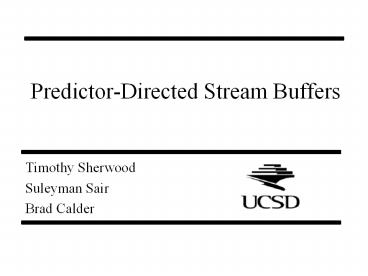PredictorDirected Stream Buffers - PowerPoint PPT Presentation
Title:
PredictorDirected Stream Buffers
Description:
Stream Buffers are one of the most used. simple to ... to data cache, register file, and MSHRs. Sherwood, Sair, and Calder. 6. Past Stream Buffer work ... – PowerPoint PPT presentation
Number of Views:42
Avg rating:3.0/5.0
Title: PredictorDirected Stream Buffers
1
Predictor-Directed Stream Buffers
- Timothy Sherwood
- Suleyman Sair
- Brad Calder
2
Overview
- Introduction
- Past Stream Buffer work
- Predictor-Directed Stream Buffers
- Policy Improvements
- Results
- Contribution
3
Introduction
- Memory Wall
- Latency reduction through prefetching
- without eating too much bandwidth
- Stream Buffers are one of the most used
- simple to implement
- very efficient
- Pointer based codes
4
Past Stream Buffer work
- Jouppi 1990
- consecutive cache line FIFO
- Palacharla and Kessler 1994
- non-unit stride (based on memory chunk)
- allocation filters
- Farkas et. al. 1997
- PC-based stride
- fully associative / non-overlapping
5
Past Stream Buffer work
to data cache, register file, and MSHRs
store predict_stride in streaming buffer on
allocation
N buffers
from/to next lower level of memory
6
Past Stream Buffer work
- Past work targeted at streaming in arrays
- either in sequential order
- or stride order (multidimensional array)
- Could not handle Pointer Codes
- repetitive non-striding references
- Need a more General Predictor
7
Predictor-Directed Stream Buffer
- The Goal Simple and efficient hardware based
prefetching of complex but predictable streams - Approach Take a general predictor and hook it up
to the well established stream buffer front end. - Separate the predictor from the prefetcher
- Can use almost any predictor
- 2 Delta
- Context
- Markov
8
PSB Generalized Architecture
to data cache, register file, and MSHRs
Prediction Info
subset of prediction info
predicted address
Load PC History Stride Confidence Last Address
update prediction information
predicted address
N buffers
from/to next lower level of memory
9
PSB Stages
- Allocation
- Prediction
- Probe
- Prefetching
- Lookup
10
Stage Descriptions
- Allocation
- Stream Buffer is allocated to a particular load
- the buffer is initialized
- subject to Allocation Filters
- Prediction
- an empty buffer entry asks for an address
- subject to limited predictor speed.
11
Stage Descriptions (Continued)
- Probe
- if there are free ports remove useless prefetches
- not mandatory
- Prefetching
- subject to scheduling for ports and priority,
prefetches are sent to memory - Lookup
- when a load performs an L1 access, the Stream
Buffers are checked in parallel
12
PSB Implementation
- Tried many different address predictors
- Best is Stride Filtered Markov
- similar to Joseph and Grunwalds Predictor
- first order Markov
- striding behavior is filtered out
- Difference is stored to reduce size
13
Difference Storing
14
PSB with SFM
15
Methods
- SimpleScalar 3.0
- Rewrote memory hierarchy
- Model bandwidth between all levels
- Added perfect store sets
- Ran over set of Pointer Benchmarks
- 2K entry predictor table
- 8 buffers x 4 entry Stream Buffers
- 32k 4-way associative cache
16
Speedup from PSB
17
Allocation Filtering
- Farkas et.al. showed how two miss filtering
- prevents too many streams requesting resources
- Does not work as well for pointer codes
- irregular miss patterns
- We use Priority and Accuracy Counters
- track behavior of Loads
- allocate to Loads that are Behaving well
18
Allocation Filtering Speedup
19
Stream Buffer Priority
- Round Robin
- give each active buffer equal resources
- predictor and prefetching
- Priority Counters
- uses small counters with each buffer
- use the counters to rank buffer
- more resources to better performing buffers
20
Priority Scheduling Speedup
21
Latency Reduction
22
Contributions
- Predictor-Directed Stream Buffers allow
decoupling of Stream Buffer front end from
address generation - Using accuracy based allocation filtering and
priority scheduling can make a large difference
in performance - With some simple compression, even small Markov
tables can be very effective
23
Accuracy
24
Bus Results































